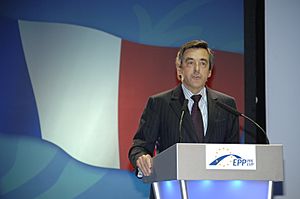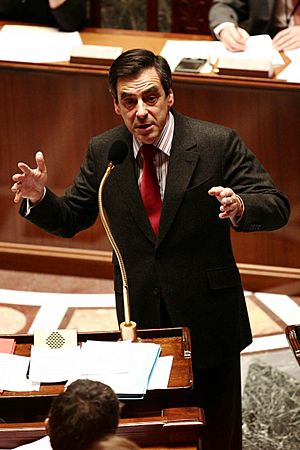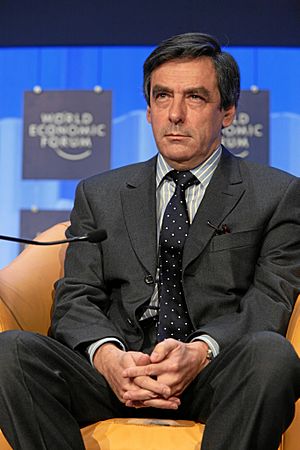François Fillon facts for kids
Quick facts for kids
François Fillon
|
|
|---|---|
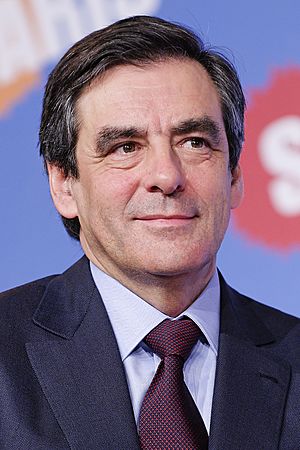
Fillon in 2010
|
|
| Prime Minister of France | |
| In office 17 May 2007 – 15 May 2012 |
|
| President | Nicolas Sarkozy |
| Preceded by | Dominique de Villepin |
| Succeeded by | Jean-Marc Ayrault |
| Member of the National Assembly for Paris's 2nd constituency |
|
| In office 20 June 2012 – 20 June 2017 |
|
| Preceded by | Jean Tiberi |
| Succeeded by | Gilles Le Gendre |
| Minister of Ecology, Sustainable Development, Transport and Housing | |
| In office 23 February 2012 – 16 May 2012 |
|
| Prime Minister | Himself |
| Preceded by | Nathalie Kosciusko-Morizet |
| Succeeded by | Nicole Bricq (Ecology, Sustainable Development and Energy) |
| Minister of National Education, Higher Education and Research | |
| In office 31 March 2004 – 31 May 2005 |
|
| Prime Minister | Jean-Pierre Raffarin |
| Preceded by | Luc Ferry (National Education and Research) François Loos (Higher Education) |
| Succeeded by | Gilles de Robien |
| Minister of Social Affairs, Labour and Solidarity | |
| In office 7 May 2002 – 30 March 2004 |
|
| Prime Minister | Jean-Pierre Raffarin |
| Preceded by | Élisabeth Guigou |
| Succeeded by | Jean-Louis Borloo |
| President of the Regional Council of Pays de la Loire | |
| In office 20 March 1998 – 16 May 2002 |
|
| Preceded by | Olivier Guichard |
| Succeeded by | Jean-Luc Harousseau |
| Minister delegate for Posts, Telecommunications and Space | |
| In office 7 November 1995 – 2 June 1997 |
|
| Prime Minister | Alain Juppé |
| Preceded by | Himself (Information Technologies and Posts) |
| Succeeded by | Christian Pierret |
| Minister of Information Technologies and Posts | |
| In office 18 May 1995 – 7 November 1995 |
|
| Prime Minister | Alain Juppé |
| Preceded by | José Rossi (Industry, Posts and Telecommunications and External Trade) |
| Succeeded by | Franck Borotra (Industry, Posts and Telecommunications) Himself (Information Technologies and Posts) |
| Minister of Higher Education and Research | |
| In office 30 March 1993 – 11 May 1995 |
|
| Prime Minister | Édouard Balladur |
| Preceded by | Hubert Curien (Research) |
| Succeeded by | François Bayrou |
| Member of the National Assembly for Sarthe's 4th constituency |
|
| In office 20 June 2007 – 19 July 2007 |
|
| Preceded by | Marc Joulaud |
| Succeeded by | Marc Joulaud |
| In office 12 June 1997 – 19 July 2002 |
|
| Preceded by | Pierre Lefebvre |
| Succeeded by | Marc Joulaud |
| In office 2 July 1981 – 1 May 1993 |
|
| Preceded by | René Pailler |
| Succeeded by | Pierre Lefebvre |
| President of the General Council of Sarthe | |
| In office 20 April 1992 – 20 March 1998 |
|
| Preceded by | Michel d'Aillières |
| Succeeded by | Roland du Luart |
| Personal details | |
| Born |
François Charles Amand Fillon
4 March 1954 Le Mans, France |
| Political party | The Republicans (since 2015) |
| Other political affiliations |
|
| Spouse |
Penelope Clarke
(m. 1980) |
| Children | 5 |
| Alma mater |
|
| Signature |  |
François Charles Amand Fillon (born 4 March 1954) is a retired French politician. He is best known for serving as the Prime Minister of France from 2007 to 2012. He worked alongside President Nicolas Sarkozy.
Fillon was a member of a centre-right political party called The Republicans. He was chosen as his party's candidate for the 2017 French presidential election. However, he finished third in the first round of voting and did not advance.
Before becoming prime minister, Fillon held several important government jobs. He was the Minister of Labour, where he made changes to France's work and retirement laws. He also served as the Minister of National Education.
After his time as prime minister, Fillon ran for president in 2017. He was seen as a strong candidate at first. But his campaign was hit by a major controversy known as "Penelopegate," which involved payments made to his wife. This hurt his popularity, and he lost the election.
After leaving politics, Fillon worked for private companies.
Contents
Early Life and Education
François Fillon was born on March 4, 1954, in Le Mans, a city in the Sarthe region of France. His father was a legal professional, and his mother was a history professor. He has two younger brothers. One is the president of the car club that runs the famous 24 Hours of Le Mans race, and the other is a jazz pianist.
Fillon went to college at the University of Maine in Le Mans, where he earned a degree in public law in 1976. He continued his studies at Paris Descartes University in Paris.
A Career in Politics
Fillon was involved in French politics for many years. He held jobs at the local, regional, and national levels.
Early Political Steps
Fillon's political career began in the Sarthe region where he grew up. In 1981, at the age of 27, he was elected to the National Assembly, which is one of the two houses of the French Parliament. He was one of its youngest members at the time.
From 1983 to 2001, he was the mayor of the town of Sablé-sur-Sarthe. He also served as the President of the General Council of Sarthe from 1992 to 1998.
Working in the Government
In the 1990s and 2000s, Fillon was appointed to several minister positions in the French government. A minister is in charge of a specific government department.
- Minister of Higher Education and Research (1993–1995)
- Minister of Social Affairs, Labour and Solidarity (2002–2004): In this role, he worked on changing the laws about the 35-hour workweek and the French retirement system.
- Minister of National Education (2004–2005): He introduced a new law on education that led to many debates.
Prime Minister of France
In 2007, Nicolas Sarkozy was elected president of France. He chose François Fillon to be his prime minister. The prime minister is the head of the government and is responsible for carrying out the president's policies.
Fillon served as prime minister for five years, until Sarkozy was defeated in the 2012 French presidential election. When François Hollande became the new president, Fillon resigned, and Jean-Marc Ayrault was appointed to replace him.
2017 Presidential Election
After his time as prime minister, Fillon decided to run for president himself.
Winning the Primary
To become a presidential candidate, Fillon first had to win his party's primary election in 2016. A primary is an election where party members choose their main candidate. Fillon was not expected to win, but he surprised many people by finishing first. He defeated other well-known politicians like Alain Juppé and former president Nicolas Sarkozy. After this victory, many people thought he would become the next president of France.
A Difficult Campaign
At the start of 2017, Fillon was a leading candidate in the polls. However, his campaign ran into serious trouble. A newspaper published a story that raised questions about jobs his wife and children had been paid for. The story claimed they received large salaries for work that may not have been real.
This controversy became known as the "Penelopegate" (named after his wife, Penelope). The news caused a public outcry and badly damaged Fillon's reputation. His support in the polls dropped quickly. Despite the pressure, he decided to continue his campaign.
In the first round of the presidential election on April 23, 2017, Fillon finished in third place. Only the top two candidates, Emmanuel Macron and Marine Le Pen, moved on to the final round.
Personal Life
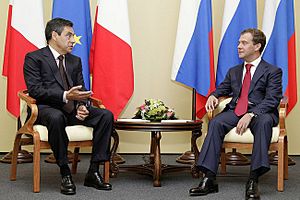
Fillon is married to Penelope Clarke, who is from Wales in the United Kingdom. They met when she was in France teaching English. They married in 1980 and have five children. The family lives in a historic home near the town of Sablé-sur-Sarthe.
Fillon is a big fan of car racing. He grew up near Le Mans, home of the famous 24 Hours of Le Mans race. He has attended the race almost every year since he was a child. He is a member of the car club that organizes the event, and his brother Pierre is the club's president. Fillon has even participated in historic car races on the famous track.
Images for kids
-
Fillon with Polish President Lech Kaczyński in October 2007.
-
Fillon with José Manuel Barroso, the President of the European Commission, in June 2009.
See also
 In Spanish: François Fillon para niños
In Spanish: François Fillon para niños
- Robert Bourgi
 | Valerie Thomas |
 | Frederick McKinley Jones |
 | George Edward Alcorn Jr. |
 | Thomas Mensah |


